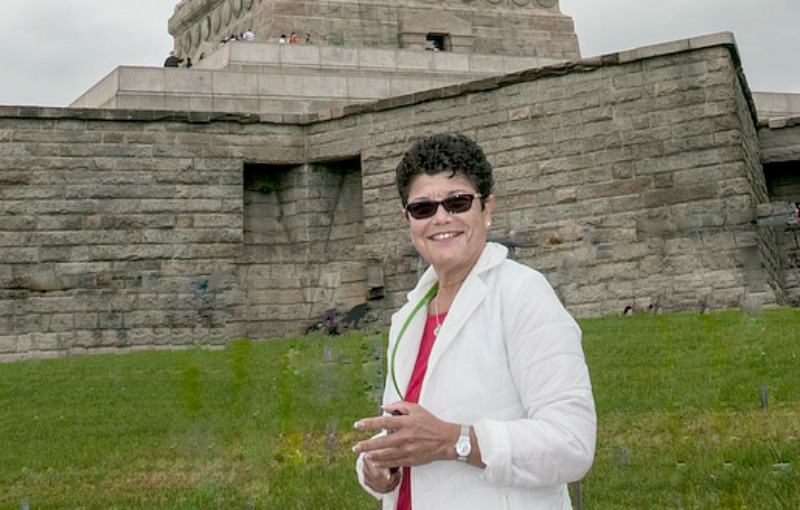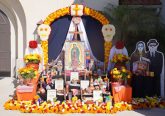Helping Spanish-speaking families with mental illness

“Temporary”position transforms to lifelong mission for Everyday Evangelist Norma Quinteros
By Walt Schaefer
After more than 30 years as a teacher, Norma Quinteros is dreaming of a new mission.
Faced with a family member coping with mental illness, Quinteros, a native of Argentina and largely educated there, became involved with the National Alliance for Mental Illness (NAMI) and participated in its Family to Family program, a workshop geared to support, teach, and offer resources to the family members of people suffering with mental illness.

Quinteros was then asked to teach the program and, after some initial reluctance, agreed. But her commitment will not end there.
The 65-year-old teacher and member of St. Julie Billiart Parish in Hamilton is active in the Hispanic and Latino community. Many members speak Spanish as their first language.
”My next project will address what needs to be done to make this program available to the Spanish-speaking people of our community,” said Quinteros.
She has years of experience with that, having arrived in the United States in 1979 after being recruited to teach in a magnet program in the Cincinnati Public Schools.
“They needed teachers and they were recruiting second language and other instructors for their alternative programs,” she said. “I applied, as did many young people at that time in Argentina. South America was in a little bit of turmoil, so a lot of young people were trying to find opportunities abroad and a professor of mine told me about the opportunity in Cincinnati. We all thought it was going to be something temporary, and it turned out to be a lifetime.”
While teaching for CPS, Quinteros shared her skills as an educator with children of Spanish-speaking immigrants at the Cincinnati Hispanic Ministry at St. Charles Borromeo parish in Carthage, as well as in Hamilton.
“Sometimes God puts things in front of you when you least expect them and you take a path that you never thought you would,” she said. “You then realize life has been preparing you for that turn.”
For Quniteros, involvement with NAMI followed the same path, for the same reasons. “Hispanics have the same challenge with young people with mental illness,” she explained. “People struggle because in many cases there’s a tremendous lack of understanding, a lot of misinformation, and a lot of prejudice toward mental illness. With the Hispanic families, because sometimes there’s the barrier of language, they prefer to stay private. There are certain conditions for which they do not have any support — depression, alcoholism, bipolar disorder. violence in the home — so hopefully we will put things in place to help them.
“Because my family was struck with an issue that has to do with a mental illness, I became involved with NAMI,” she continued. “We become teachers because we like to learn, and I became involved as a participant in Family to Family to learn. I went to the program’s facilitator training and I realized that there was a need, that I could offer something. For the past three summers I’ve helped teach the program. I became enriched by the experiences people came to share. We get to know parents, spouses and other loved ones dealing with some area of mental illness or addiction. It is formidable”
During her third summer leading the program, St. Julie Billiart’s pastor, Father Mike Pucke, was asked to be on the Butler County Board of Mental Health. Quinteros saw an opportunity to expand NAMI’s outreach to Hispanic families.
“There’s a lot that needs to be done for this program be to become available to the Spanish-speaking community,” she said. “A large number of Hispanics are moving into the Hamilton area. Among the Latino population, faith and family are at the top of the list. When a family moves in, they usually tell other people and bring other family members and friends after them, and the community grows rapidly. Father Mike, too, has created a great sense of community at St. Julie’s and has been able to achieve what at one point seemed an issue: acceptance by the regular community and the slow movement toward integration.”.
Quinteros said her ministry as a lector at St. Julie– primarily at Masses and celebrations in Spanish and those that are bilingual — has been among the most rewarding experiences of her life.
“Being a lector has had a great impact. Having been a teacher for so long, I firmly believe in preparation. When I have a turn to read, I prepare to the point where I am just a voice. That’s all. It has helped me to really listen to the word of God. I prepare a lot, and when you read, you need to forget that it is you in front of all the others. You are no longer you but the voice of God through the Scriptures. I find a great peace, and it comes from knowing that it is not what I’m saying, but that God is speaking through me.”
For information on St. Julie Billiart Parish, visit StJulie.net or call (513) 863-1040.
Find a NAMI Chapter
The National Alliance on Mental Illness helps families of people diagnosed with mental illness to help each other by providing support, education, and advocacy. Its chapters offer classes, support groups, and other activities. For information on NAMI in Ohio, visit NAMIOhio.org. NAMI has numerous county affiliates within the Archdiocese of Cincinnati. For information, conatct them at:
Butler County: NAMI-bc.org
Clark and Green Counties: NAMIcgm.org
Darke County (Troy): (937) 335-7727
Auglaize County: (419) 692-2480
Miami County: (937) 335-7727
Shelby County: (937) 335-7727
Highland County: (740) 701-7297
Hamilton, Warren, and Clermont Counties: namiswoh.org
Urban Greater Cincinnati: ugcnomi.org













